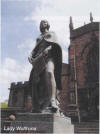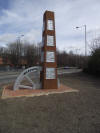As a country we have a long history, which stretches back centuries, finding evidence of settlements even before Caesar came and claimed Britain for Rome. Therefore, one of the most difficult parts of history is origins and in particular names of towns or villages. We have some funny, oddly sounding places and for many we will never know the true origins of where they came from. For countries like Australia and the USA (whose history is only a few centuries old) it is easy, but for us we have to be able to understand texts written in dead languages that have now morphed into what we find in our modern times and hope to stumble on old forgotten texts.
With Bilston there is the same problem. Through translating old Anglo-Saxon charters, we find that there has been a settlement in this area since 985, where it is referred to as Bilsatena, and in 996, where it is referred to as Bilsetnatum. The references don’t detail what the area was like, but must have had some importance, as the charter from 985 tells of the land being gifted to Lady Wulfrun, whom then in 996 has a charter written allowing the Archbishop of Canterbury to build a monastery.Bilston is not mentioned again until nearly a century later when it is called Billestone in the Domesday Book and for the next few centuries would be referred to as Byllestone, Billsington, Bylstune, Bylston, Bilson and, finally, Bilston. The changes in spelling could be due to the changes in languages over the decades and due to whomever was writing, but it’s apparent that every spelling has its similarities and is the key to unlocking what the name of Bilston means.
There are a couple of theories of where the name originated and opinion is different when reading past and modern day historians. The second half of the name, be it -catena or -ton is generally accepted to mean “the dwellers at Bil” with -satena being the Old English for settlers and -ton equating to dwelling place or settlement. This seems reasonable enough, but what of the Bil- part?

|

|

|
| Lady Wulfruna | Bilstone |
Bilston from
Sedgley Beacon |
A modern perception, as detailed by Frank Sharman’s History of Bilston, is that Bil- may be in reference to a prominent hill. This prominent hill could be Sedgley Beacon, which would have towered over its surrounding areas a thousand years ago. Before industrialisation, the hill, which stands at 778ft above sea level, would have been visible from Bilston and its dwellers.
My favourite story for where the name of Bilston originates comes from works of George Lawley, whom wrote a History of Bilston in the 19th century. In his works he references a Dr. Oliver whom had translated a Latin copy of Lady Wulfrun’s charter and where Bilston is spelt Belstona. Dr. Oliver and Lawley state that it is this spelling that allows us to understand how the town we know today became to be named.
They focus on the Bel- part, which is a Saxon word for ‘sun’. This could be linked to the pre-Christian paganism, whereby much of the Midlands would have worshipped the sun; along with many other gods. The area may have had some religious importance for many decades; as, aforementioned, Lady Wulfrun giving the area to the now every dominating Christian church. Perhaps she did this to bring together the new religion with the entrenched paganism.
I feel this theory holds merit, as the area would have been one of natural beauty and mystery where kings and lords would visit to hunt in the forests and feast at Stowheath Manor, which lay between Bilston and Etting-shall, but, unfortunately, Lawley only references this one spelling of Belstona and we are left every wondering.
I do not mind that the name is ultimately a mystery. It makes Bilston unique to its neighbouring towns and cities, which have all had their names deciphered, and leaves us imagining a Bilston that would have been so different to what we know now.
Do you have a theory on how Bilston got its name? Write in or email and we’ll share it with the readers.

